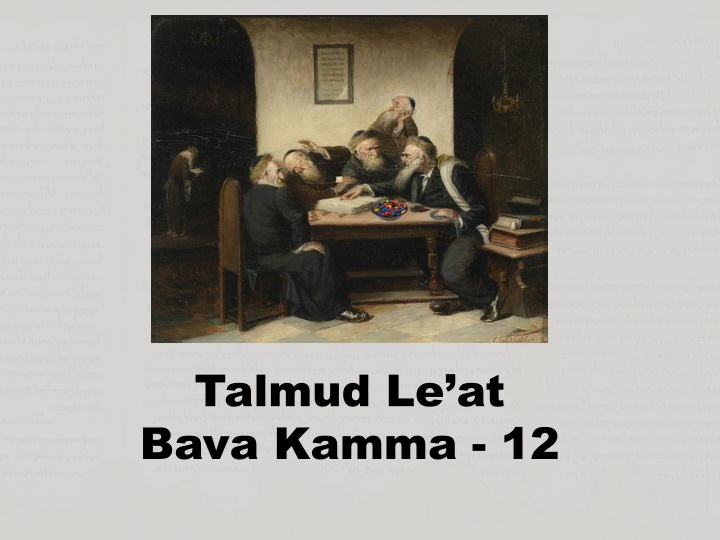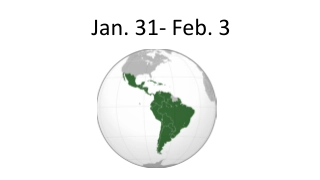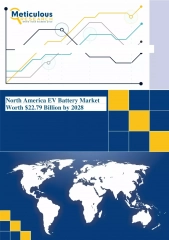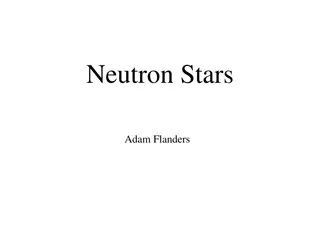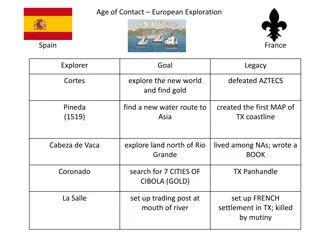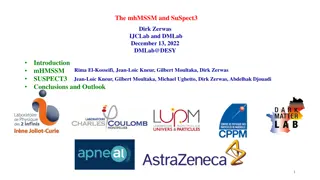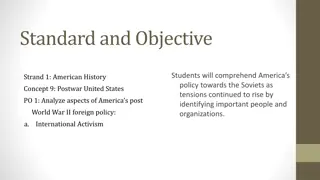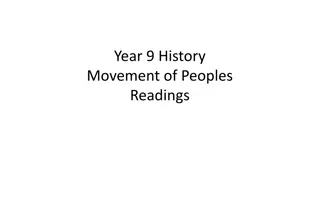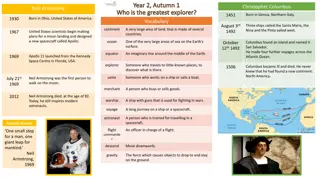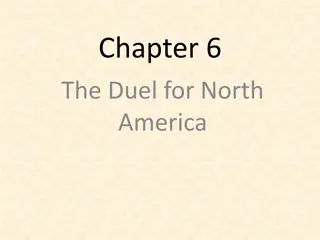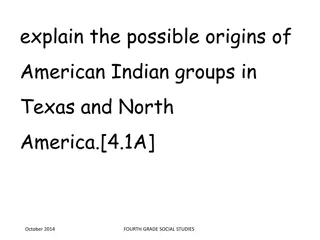Explorers and Discoveries in North America
"Marquette and Jolliet, Henry Hudson, Samuel de Champlain, and more explorers made significant discoveries in North America. Learn about their expeditions, interactions with Native Americans, and the lessons from their quests for the Northwest Passage. Understand the decision-making processes involved in exploration and the impacts of these historical events on the continent's colonization."
Download Presentation

Please find below an Image/Link to download the presentation.
The content on the website is provided AS IS for your information and personal use only. It may not be sold, licensed, or shared on other websites without obtaining consent from the author.If you encounter any issues during the download, it is possible that the publisher has removed the file from their server.
You are allowed to download the files provided on this website for personal or commercial use, subject to the condition that they are used lawfully. All files are the property of their respective owners.
The content on the website is provided AS IS for your information and personal use only. It may not be sold, licensed, or shared on other websites without obtaining consent from the author.
E N D
Presentation Transcript
Talmud Leat Bava Kamma - 12
Review Exodus 22:4 "From the best of his land" The buyer of land takes the place of the owner Creditor collects from the last piece of land sold As long as the debtor has any other property, collect from that land first (Rabbinic Decree) You don't have to take the Rabbinic Decree 2 Talmud Le'at - 11
Review Superior Medium Inferior Reuven Superior Medium Inferior Shimon 3 Talmud Le'at - 11
Two Buyers Scenario 1 Superior Medium Inferior Reuven Superior Medium Inferior Shimon Inferior Medium Levi 4 Talmud Le'at - 11
Bava Kamma 8b , ! " : " It is obvious! buyer sold the medium and inferior land and retained the superior, they may come and collect out of the superior. For it is the last and he no longer has the medium and inferior such that he could say to them: "Collect from the medium and inferior land, as I do not wish the rabbinic decree". 5 Talmud Le'at - 11
Bava Kamma 8b , ? But if he sold superior land and held onto medium and the inferior, then what? 6 Talmud Le'at - 11
Two Buyers Scenario 2 Superior Medium Inferior Reuven Superior Medium Inferior Shimon Superior Levi 7 Talmud Le'at - 11
Bava Kamma 8b : Abaye thought to say: They all come and collect superior. 8 Talmud Le'at - 11
Bava Kamma 8b ". ? " : " , , " . " " , " Rava said to him: "What did the first sell to the second? All the rights that came into his possession". Hence if they had come to the first buyer, he can pay them out of medium and inferior. And even though he purchased medium and inferior, superior was still unsold. One does not collect from encumbered property when unsold property is available, because he can say to them "I do not want to take advantage of the rabbinic decree". 9 Talmud Le'at - 11
Bava Kamma 8b " " " " The second can also say to him, "Take medium and inferior land" for when the second bought it, he acquired from the first all the rights that come with it. 10 Talmud Le'at - 11
Bava Kamma 8b , , " Rava said: If Reuven sold of all his lands to Shimon, and Shimon went and sold one field to Levi, and Reuven's creditor comes, he so desires, he may collect from this one and if he so desires, he may collect from that one. : , 11 Talmud Le'at - 11
Bava Kamma 8b ; , " This was said only when he bought medium quality; " : " but if he bought superior or inferior, no, as he may say to him: "I was careful to buy superior or inferior, land which is not fit for you" 12 Talmud Le'at - 11
Bava Kamma 8b , " " " " " " And if he bought medium as well, this was said only where he did not leave equivalent medium, in which case he is unable to say, "I left a place for you with Shimon" But if he did leave Shimon equivalent medium, the creditor may not collect from him for he may say, "I have left for you land to collect from". 13 Talmud Le'at - 11
Bava Kamma 8b " : , " Abaye said: Reuven sold a field to Shimon with a guarantee and one of Reuven's creditors comes and seized from Shimon, the law is that Reuven can go and litigate with, and he cannot say, "I am not legally answerable to you" for Reuven can say to him: "If you take from him, he will return to me." 14 Talmud Le'at - 11
Bava Kamma 8b " , " : " There are some who say: Even if there was no guarantee as well, as he may say to him: "It is not satisfactory for Shimon to have a grievance against me." 15 Talmud Le'at - 11
Bava Kamma 9a : , ; , ? , " " " And Abaye said: If Reuven sold a field to Shimon without a guarantee and there appeared claimants, so long as he had not yet taken possession he may renege; but after he has taken possession he can no longer renege. What is the reason? He can say to him: "You have agreed to accept a tied bag". 16 Talmud Le'at - 11
Bava Kamma 9a ? From what moment is he considered to have taken possession? From the moment he steps on the border marks. 17 Talmud Le'at - 11
Bava Kamma 9a , . ' " " And specifically without a guarantee. But if there was a guarantee, no. And there are those who say: Even with a guarantee, as he may still say to him: "Show me the claim document and I will repay you". 18 Talmud Le'at - 11
Bava Kamma 9a " " " : " : R. Huna said: either with money or with the best of his land. R. Nahman objected to R. Huna: "He shall recompense" (Exodus 21:34) to include the equivalent of money, even bran. 19 Talmud Le'at - 12
Bava Kamma 9a ? ! , ? " What are we dealing with here? Where nothing else is available. If nothing else is available, it is obvious! What might you have thought? That we tell him to go and take the trouble to sell and bring him money. Therefore he teaches us 20 Talmud Le'at - 12
Bava Kamma 9a : ? " " R. Assi said: Money is equivalent to land. With regard to what Halacha? If with regard to "the best" this is what R. Huna said. 21 Talmud Le'at - 12
Bava Kamma 9a , , ? ? Rather, to two brothers who divided, one land and one money, and a creditor came and seized land That this one can go and take half the other's money together with. But is this not obvious? Is one a son and the other not a son? 22 Talmud Le'at - 12
Bava Kamma 9a . " " , , There are those who say on the contrary. From the opposite direction, one may say, "It was for this I took money, that if it is stolen I would not be reimbursed from you, and with this you took the land that if it be seized, you would not be reimbursed by me." 23 Talmud Le'at - 12
Bava Kamma 9a Rather, to two brothers who divided and a creditor came along and seized the portion of one of them. 24 Talmud Le'at - 12
Bava Kamma 9a ? . : : : " " : " " " " But didn't R. Assi say this before? For it was stated: the brothers who divided and a creditor came along and seized the portion of one of them. Rav said: "The division is annulled" and Shmuel said: "waived" and R. Assi said: "He takes a quarter in land and a quarter in money". 25 Talmud Le'at - 12
Bava Kamma 9a : Rav said the division is annulled, for he holds that brothers that divide are like inheritors. 26 Talmud Le'at - 12
Bava Kamma 9a Shmuel said waived, for he holds that brothers who divide are like purchasers, and like a purchaser, without a guarantee. 27 Talmud Le'at - 12
Bava Kamma 9a ; And R. Assi said that he takes a quarter in land and a quarter in money, for he is in doubt as to whether they are like heirs or purchasers, therefore they take a quarter in land and a quarter in money. 28 Talmud Le'at - 12
Bava Kamma 9a "? " . What then is the meaning of "equivalent to land"? With regard to "best" If so, this is Rav Huna. And say this is Rav Assi too. 29 Talmud Le'at - 12
Bava Kamma 9a : " ? " " R. Zeira said R. Huna said: For a commandment, up to a third. A third of what? If we say "a third of one's estate," but if that is so and it happened to have three commandments, should he give his entire estate? 30 Talmud Le'at - 12
Bava Kamma 9b : ' Rather R. Zeira said: For adorning a mitzvah, up to a third in the mitzvah. 31 Talmud Le'at - 12
Bava Kamma 9b ? : R. Ashi asked: Is it a third from within or is it a third from without? This stands undecided. 32 Talmud Le'at - 12
Bava Kamma 9b : " In the West they said in the name of R. Zeira: Up to a third, from his own; from this forward, from the Holy One, Blessed be He. 33 Talmud Le'at - 12
Hanukkah Beautify a mitzvah - Regular one candle each night per family Mehadrin one candle each night per family member Mehadrin L Mehadrin add a candle each night for each family member 34 Talmud Le'at - 12
